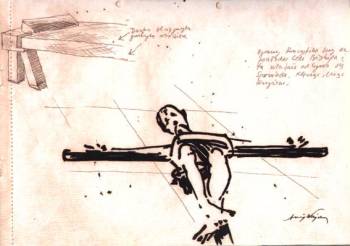 | ||||||||||
The Gates To The Paradise
 fot: Renata Pajchel |
It was my idea to make the children's crusade the subject of my next film, based upon Jerzy Andrzejewski's story. When I shared this project with Andrzejewski, he responded with his usual enthusiasm. It took us months, however, to produce the first scenes from which the plot of the future film would emerge:
The rejection of the project by Polish Cinematography Committeee meant that the delicate, poetic substance of Gates of Paradise would be exposed to the brutal realities of international film coproduction. The dialogues were translated into English and I have never learnt whether the translations conveyed anything beyond the bare message. Young actors were summoned, with Mathieu Carri(e)re as the only veteran (of Schl÷ndorff's wonderful film Die Verwirrungen des Z÷glings T÷rless). Two male roles were given to actors I knew from films by Polanski who was trying to help me with the difficult casting. Finally we decided on Yugoslavia as our location. The film was so dominated by the rocky mountain landscape that the crusade seemed to be standing immobile on the screen, rather than marching on for weeks on end.
I felt trapped and confined.
Gates of Paradise, which had inspired me with such high hopes for so many years, might have been the dream film of my life. Today, as I look at the photographs of the boys' faces, so beautiful and clear, or leaf through the sketches done on odd bits of paper and featuring Blanka's windblown hair enveloping Alexis' head or two boys, dressed up as angels, carrying a third one, whose wings are broken; or when I recall the breathtaking beauty of the Yugoslav landscape, now in ruin and decay, I really cannot say why I failed to show all this on the screen. The only answer I have is that I had trusted my most intimate dreams to a group of chance people - producers, actors, technicians - who reduced them down to match their own tastes and sensibilities, leaving me absolutely helpless.
Andrzej Wajda
Reviews
Andrzejewski's novel was noticed for two reasons. Firstly: it is composed of two sentences, of which one is a hundred and some odd pages long, while the other occupies but a single line. Secondly, the book is a masterpiece. The film's director responded to the writers experiment with his own. Unfortunately, the visual rendition of the thoughtfully deployed words of exaltation and dissillusionment that convey the powerful passions of death and of stormy romances, intensifying as the East is approached, does not match the power and the harsh greatness of the book. Each idea has been transformed into its visual equivalent.
Illustration and interpretation, however, tend to narrow the horizon of thought by favouring, if not imposing, a single point of view. The creative element is thus reduced. Wajda betrays the original by remaining faithful to it - an eternal problem, namely the fiasco of translating the language of one art into that of another.
Claude Michel Cluny
"Cinéma 79", Paris, December 1979
The fact is that all of Wajda's films derive their power from the way they have joined in - or even triggered off - some significant debate, historical, ideological, or social. Gates of Paradise, on the other hand, based as it was on a hauntingly written, extremely intelligent but slightly timeless story, was not only a limp piece of filmmaking, but worst of all a completely damp squib as far as striking any contemporary sparks was concerned.
Boleslaw Michalek
"The Cinema of Andrzej Wajda", The Tantivy Press, London-New York, 1973
Jerzy Andrzejewski's story Bramy raju is available at the Merlin bookstore
Oscar | Films | Theatre | Why Japan?
Favourites | Pictures gallery | About Wajda | Bibliography
Main Page | Search | Wersja polska
Copyright © 2000 Proszynski i S-ka SA. All rights reserved